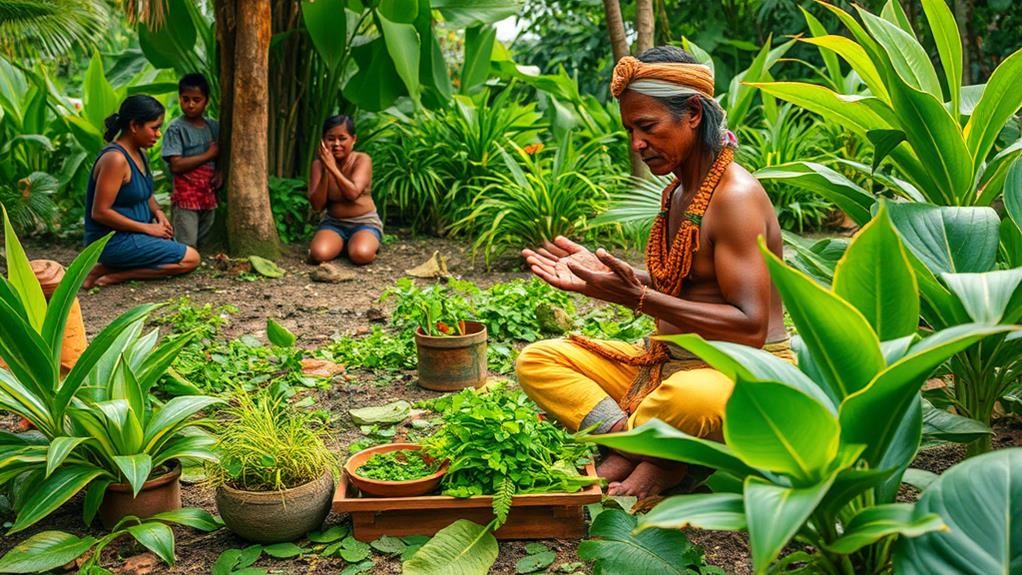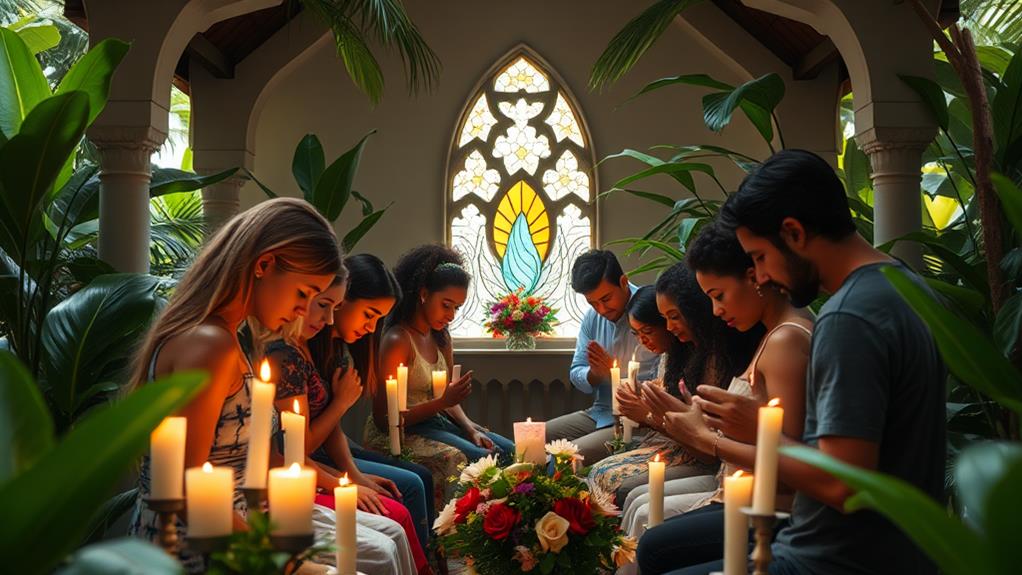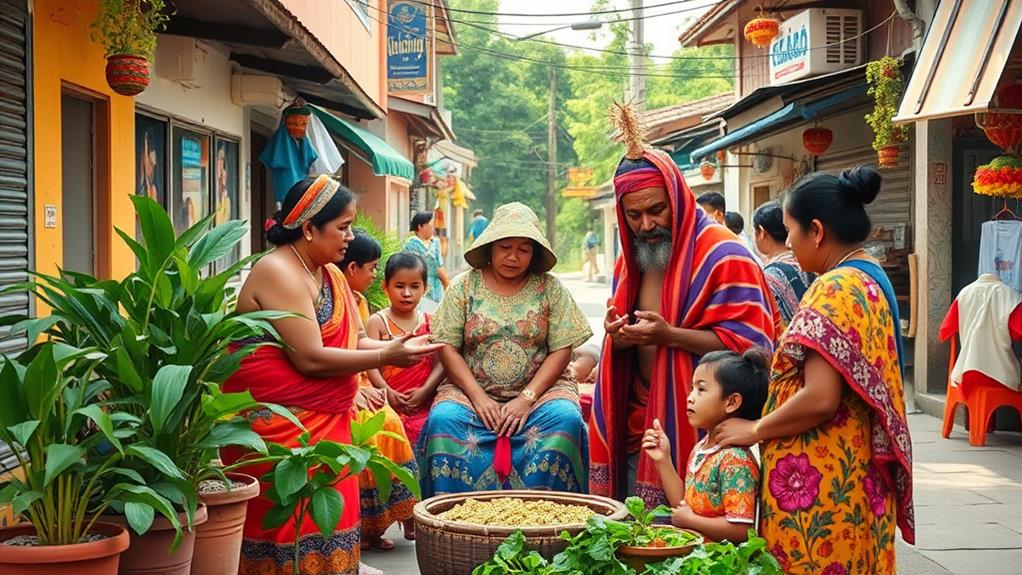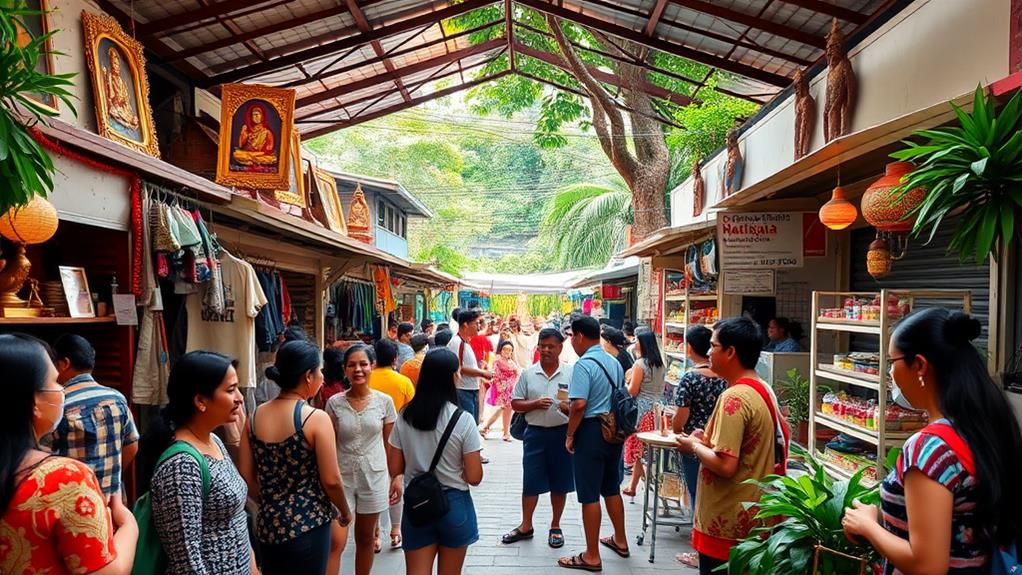Religion significantly influences healthcare decisions in the Philippines. This is primarily due to the strong presence of Catholicism, which shapes cultural practices and values.
For instance, spirituality plays a crucial role in coping with health crises, with many Filipinos relying on prayer and faith-based support to navigate difficult times.
Traditional healing methods often coexist with modern medical treatments. This can lead to delays in accessing professional care, as some individuals may prioritize alternative approaches over conventional medicine.
For example, some Filipinos may seek the help of albularyos, or traditional healers, who use herbal remedies and ritualistic practices to treat illnesses.
Family dynamics also impact healthcare choices. In Filipino culture, the collective well-being of the family often takes precedence over individual needs. This can result in healthcare decisions being made with the family's interests in mind, rather than solely focusing on the individual's health requirements.
Understanding these cultural influences is crucial for improving health outcomes and access to healthcare in the Philippines.
By recognizing the complex interplay between religion, traditional practices, and family dynamics, healthcare providers can develop more effective strategies to address the unique needs of Filipino patients.
Overview of Religion in the Philippines

The Philippines has a predominantly Catholic population, with approximately 85% of the population identifying as Catholic. This makes it the only Asian country with a significant Catholic majority.
Catholicism plays a crucial role in shaping Filipino culture, influencing aspects such as healthcare and mental health practices.
Catholic rituals and celebrations, like patron saint feasts, foster community bonds and provide emotional support during challenging times. For instance, many Filipinos turn to faith healers and spiritual counselors when facing health-related issues, demonstrating the strong connection between religion and spirituality in their health-seeking behaviors.
The Philippine Mental Health Law of 2018 acknowledges the interplay between religion and mental health by promoting a biopsychosocial spiritual framework. This approach recognizes that mental well-being is often intertwined with religious beliefs and practices, making it essential to consider these elements when addressing healthcare needs in the Philippines.
Family Influence on Health Decisions
Family dynamics significantly impact health care decisions among Filipina Americans. This impact often prioritizes collective well-being over individual health needs. In many instances, authority figures within families make these choices, leading individuals to rely on their advice rather than seeking professional medical guidance.
There are several types of family influences that shape health care decisions:
| Influence Type | Description | Impact on Health Decisions |
|---|---|---|
| Authority Figures | Parents or elders often lead discussions | Decisions may prioritize tradition over professional care |
| Trusted Family Members | Relatives in health professions provide advice | Guidance shapes treatment approaches and may delay intervention |
| Emotional Ties | Strong family bonds create barriers | You might avoid seeking professional care, opting for familial support |
| Spiritual Well-Being | Religiosity and spirituality often guide choices | May lead to reliance on faith-based remedies over medical treatment |
These dynamics can complicate long-term health outcomes, especially when emotional ties overshadow the need for immediate and effective medical intervention. Balancing family influence with professional healthcare becomes essential for promoting individual well-being.
Traditional Healing Practices

Traditional healing practices in the Philippines prioritize a holistic approach to health, considering the connection between body, mind, and spirit. These practices often involve herbal remedies and spiritual rituals that reflect a deep understanding of health as a multifaceted concept.
Many Filipinos initially seek traditional home remedies for ailments. This can delay their access to professional medical care. For instance, some people may use herbal teas or steam inhalation to treat common colds before consulting a doctor.
Faith healers, known as "albularyo," play a crucial role in traditional healing practices. They provide comfort and alternative therapies that resonate with the community's cultural and spiritual beliefs.
When facing health concerns, individuals often consult not only medical professionals but also spiritual counselors or healers. This highlights the importance of spirituality in their approach to health.
The integration of traditional healing practices with modern medicine is common in the Philippines. Many people believe that using both can enhance their overall well-being.
For example, a patient may use herbal remedies to manage symptoms while also undergoing conventional medical treatment. This coexistence of methodologies allows for a more comprehensive understanding of health, as it respects individual beliefs while addressing medical needs.
Traditional healing practices remain a vital aspect of healthcare in the Philippines. They reflect the cultural values and spiritual dimensions of health among its people.
These practices provide a unique perspective on health, emphasizing the importance of spiritual and emotional well-being.
Barriers to Accessing Care
Barriers to Accessing Healthcare in the Philippines
Accessing healthcare in the Philippines can be hindered by various barriers that significantly impact individuals' decisions. These barriers often stem from cultural norms, emotional ties to family, and religious beliefs, leading many to prioritize familial advice over professional medical guidance.
Cultural Beliefs as a Barrier
Many Filipina Americans prefer traditional home remedies as their first-line treatment, which can postpone formal medical intervention. This reliance on cultural practices can delay necessary care, worsening health outcomes.
For instance, some individuals may opt for herbal medicines or spiritual healing instead of seeking professional medical help.
Emotional and Financial Concerns as a Barrier
Strong family ties and worries about financial burdens complicate decisions regarding formal healthcare services, making individuals hesitant to seek help. Family members may advise against seeking medical care due to concerns about the financial burden of treatment.
This can lead to delayed or foregone care, ultimately affecting health outcomes.
Language and Trust Issues as a Barrier
Language barriers and a preference for support from clergy may deter individuals from utilizing mental health services and other professional care, further limiting access to essential healthcare.
For example, individuals may feel more comfortable seeking guidance from a religious leader rather than a mental health professional due to language barriers or trust issues.
Understanding these barriers is crucial for improving healthcare access in the Philippines. By recognizing the role of cultural beliefs, emotional and financial concerns, and language and trust issues, healthcare providers can develop targeted strategies to address these challenges and improve health outcomes.
Role of Faith in Coping

Faith Plays a Crucial Role in Coping with Health Challenges
When faced with health crises, many individuals turn to their faith for strength and solace. In the Philippines, where 85% of the population practices Roman Catholicism, spirituality is a vital coping mechanism.
Faith Deepens During Health Crises
During health challenges, faith often deepens, and individuals may view these challenges as tests of faith that could lead to miraculous healing. This phenomenon is particularly evident in Filipino Americans diagnosed with breast cancer, who frequently turn to prayer for emotional comfort and pain relief.
Common Spiritual Coping Strategies
Several spiritual coping strategies are commonly employed by individuals navigating health challenges. These strategies include:
- Prayer: Engaging in personal or communal prayer to alleviate emotional distress.
- Rosaries: Using rosaries for meditation and prayer to provide a sense of peace.
- Novenas: Reciting specific prayers over time to foster hope and resilience.
- Church Support: Relying on community for emotional backing to enhance mental well-being.
- Faith Reflection: Contemplating faith's role in health to encourage a positive outlook.
The Influence of Religious Communities
The support from religious communities significantly influences the health-seeking behaviors of Filipino Americans, helping them navigate their challenges with greater resilience.
Spirituality and Health Outcomes
Spirituality and Health Outcomes in Filipina Americans
Spirituality plays a significant role in shaping health outcomes for Filipina Americans, particularly when facing serious conditions like cancer. High levels of religiosity often lead individuals to seek comfort in their faith, which can enhance their coping mechanisms and overall well-being.
Coping Mechanism
Spirituality serves as a coping mechanism for many Filipina Americans. Prayer, for instance, helps individuals manage physical pain and emotional distress, deepening their spiritual connection and providing comfort during difficult times.
Support Networks
Religious communities provide emotional and spiritual support, helping individuals navigate health challenges. This support network fosters resilience, positively affecting recovery.
Shaping Health-Seeking Behaviors
Cultural beliefs surrounding spirituality may influence health-seeking behaviors. Filipina Americans may prioritize spiritual remedies over conventional medical interventions, which can impact overall health outcomes.
Incorporating Spirituality into Healthcare
Incorporating spirituality into healthcare, especially in cancer treatment, has proven beneficial. It enhances emotional resilience and provides a framework for understanding life's existential challenges.
Cultural Perspectives on Illness

Cultural Beliefs Shape Illness Perception in the Philippines
In the Philippines, cultural beliefs significantly influence how people perceive and respond to illness.
Traditional home remedies are often the first line of defense against illnesses, with many Filipinos relying on these remedies due to a deep-rooted trust in familial and cultural practices.
Spirituality Plays a Crucial Role
Spirituality is a vital aspect of Filipino culture, and it plays a crucial role in shaping illness perception.
Spirituality is a source of strength and hope during health challenges, and many Filipinos attribute health improvements to their faith in God, perceiving them as miracles.
Emotional Support Prioritizes Group Harmony
Emotional support from family and religious communities is integral to the Filipino culture.
Emotional support facilitates coping and prioritizes group harmony over individual needs, often leading to delays in seeking professional healthcare.
Cultural Beliefs Influence Health-Seeking Behaviors
These cultural beliefs merge spirituality with everyday health practices, significantly influencing health-seeking behaviors.
Understanding these perspectives is essential for healthcare providers to tailor their approaches to better serve the Filipino population.
How Does the Importance of Prayer in Filipino Culture Impact Healthcare Practices in the Philippines?
The power of prayer in filipino culture plays a significant role in healthcare practices in the Philippines. Many Filipinos believe that prayer can bring healing and comfort, influencing their decision to seek medical treatment. Healthcare providers often incorporate spiritual beliefs into their approach, recognizing the importance of prayer in the healing process.
Integration of Religion and Healthcare
In the Philippines, religion plays a significant role in healthcare, influencing health-related decisions and practices. With a predominantly Catholic population, religious beliefs shape various health outcomes.
Spirituality is incorporated into mental health care, enhancing therapeutic outcomes and emotional resilience. For instance, mental health professionals in the Philippines often consider a patient's spiritual beliefs when developing treatment plans. This holistic approach helps patients cope with mental health issues more effectively.
Religious leaders serve as key support figures, guiding individuals through health challenges and fostering community connections. They provide emotional support, counseling, and spiritual guidance, which are essential for patients dealing with serious illnesses.
Faith-based practices, such as prayer and community support, are crucial for patients, especially those diagnosed with serious illnesses like breast cancer. These practices help patients cope with the emotional and psychological aspects of their condition.
The Philippine Mental Health Law of 2018 emphasizes a biopsychosocial spiritual framework, recognizing the interconnectedness of body, mind, and spirit.
Regular worship services and prayer venues in hospitals support the spiritual well-being of healthcare workers, highlighting the vital role of faith during crises. By acknowledging these elements, we can better understand how religion and healthcare coexist, ultimately contributing to holistic healing in the Philippines.
Future Directions for Research

Future research in the intersection of religion and healthcare in the Philippines should prioritize the integration of spirituality within healthcare frameworks. This approach aligns with the Philippine Mental Health Law of 2018, which advocates for a biopsychosocial spiritual model.
The role of faith-based organizations in mental health support is crucial, as they can provide insights into community resilience and coping mechanisms, especially in the wake of crises like the COVID-19 pandemic. For instance, investigating their role can uncover how they support mental health during emergencies.
Exploring the health-seeking behaviors of Filipina Americans with breast cancer will shed light on how cultural beliefs and spiritual practices shape treatment decisions. For example, researching how their beliefs influence their choices can lead to more effective healthcare strategies.
The impact of religious practices on healthcare access and adherence to treatment is also crucial, given the historical context of religion's influence on health perceptions in the Philippines. Collaboration between mental health providers and religious communities can lead to culturally relevant interventions addressing diverse populations' mental health needs.
| Research Focus | Key Insights | Potential Impact |
|---|---|---|
| Spirituality in healthcare | Enhanced mental health outcomes | Improved patient support systems |
| Faith-based organizations | Community resilience during crises | Strengthened coping mechanisms |
| Filipina Americans' health behaviors | Influence of culture on treatment | Tailored health services |
| Religious practices and treatment | Access to care and adherence | Better healthcare outcomes |
Questions and Answers
What Do Filipinos Believe About Healthcare?
Filipinos' approach to healthcare is influenced by cultural beliefs and values.
In the Philippines, family support and traditional remedies are often the first line of defense against illness. Many Filipinos turn to family members and home-based care before seeking professional medical help. This approach reflects a broader cultural understanding of healthcare access, where personal and familial networks play a crucial role.
This reliance on home-based care can sometimes lead to delays in professional medical intervention, particularly for chronic conditions. For instance, a person experiencing symptoms of diabetes might initially rely on family remedies and home care before seeking medical attention, potentially delaying diagnosis and treatment.
What Is the Relationship Between Religion and Healthcare?
Religion and healthcare are interconnected, with spiritual healing and support playing a significant role in promoting wellness. Faith-based initiatives often provide emotional and psychological support to individuals facing health challenges, which is essential for their overall well-being.
For instance, many people turn to their religious communities for guidance and comfort during illnesses, resulting in increased emotional and psychological resilience.
The connection between religion and healthcare emphasizes the importance of holistic care. This approach recognizes that spiritual well-being is integral to overall health, addressing both physical and mental health needs.
What Is the Religious Influence in the Philippines?
Religious diversity plays a significant role in shaping cultural practices and community life in the Philippines. This diversity is evident in the way people incorporate faith healing into their healthcare practices. For instance, many Filipinos seek faith healing as a complement to traditional medicine, reflecting their belief in the power of spirituality for health.
This emphasis on spiritual well-being is a common thread across various religious groups, influencing social support systems and fostering a sense of belonging.
Religion deeply intertwines with daily experiences and health-related decisions in Filipino society, making it an integral part of their cultural identity.
What Are the Traditional Healthcare Practices in the Philippines?
In the Philippines, traditional healthcare practices often prioritize herbal remedies. These remedies are frequently used as initial treatments for various ailments. For instance, some Filipinos use lagundi leaves to alleviate coughs and fever, while others consume ginger to relieve nausea.
Traditional healers, known as "albularyo," also play a significant role in the country's healthcare practices. These healers combine folk medicine with spiritual elements to provide holistic care. They often perform rituals and prayers to treat physical and spiritual ailments.
Albularyo may also use herbal remedies, massage, and other alternative therapies to promote healing.
The country's cultural heritage influences health decisions, with family dynamics often playing a crucial role. Individuals may consult with family members or traditional healers before seeking professional medical care. This approach reflects the importance of community and family ties in Filipino culture.
In many cases, alternative therapies are prioritized over professional medical care. This is because traditional healthcare practices are often more accessible and affordable, particularly in rural areas.
Additionally, many Filipinos prefer these practices due to their cultural significance and perceived efficacy.